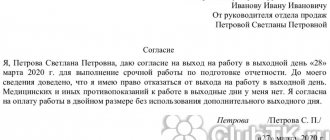Relatives working together is not prohibited
Currently, there are no restrictions on the joint work of relatives with the exception of state and municipal employees. Why does the question of restrictions on accepting relatives arise at all? This is because when labor relations were regulated by the Labor Code, it clearly stated that the joint work of persons related to each other, subordinating one of them to the other, was prohibited. Modern legislation, represented by the labor code, states that there is no discrimination based on marital status, race, gender, nationality, language, etc. it can not be. And any violation of this legislation will be punished.
Important! Employment of citizens who are closely related in all structures except government agencies is commonplace and does not contradict the law.
Exception - Federal state institutions and Federal state unitary enterprises
Where did these exceptions come from since the Labor Code says nothing about them? These exceptions are prescribed in the Anti-Corruption Law, as well as in the Government Decree of February 5, 2020 and in some other local acts. These legislative documents describe cases when persons who are related by blood cannot work together. These cases concern employees when all three conditions are met:
- Those employed in the state and municipal spheres, in particular these include all our Russian officials;
- If there is a close relationship, if one employee is controlled by another. Simply put, one is subordinate to the other.
- When such employees who are close relatives carry out financial and economic activities.
We also have Federal Law No. 119-FZ of July 31, 1995 “On the Fundamentals of the Civil Service of the Russian Federation,” in which Article 21 states: “A citizen cannot be accepted into the civil service and be in the public service in the following cases: 5 ) close relationship or relationship (parents, spouses, brothers, sisters, sons, daughters, as well as brothers, sisters, parents and children of spouses) with a civil servant, if their public service is related to the direct subordination or control of one of them to the other.
Important! The work of close relatives when one person is under the control of another is prohibited in the Pension Fund, Social Insurance Fund, Federal Compulsory Medical Insurance Fund, and the Central Bank of the Russian Federation.
Since January 24, 2020, the Law of July 15, 2015 No. 305-Z “On the fight against corruption” (hereinafter referred to as the Law), in accordance with paragraph 5 of Art. 47 of which the first part of Art. 27 of the Labor Code is set out in a new edition: for persons who are closely related and related, there are restrictions on joint work. However, they apply only to certain positions in the same organization or its separate division (Part 1 of Article 27 of the Labor Code, Part 2 of Article 18 of the Law).
Prohibition on joint work: labor legislation norms
Part two of Art. 18 of the Law establishes a ban on joint work in the same state organization (separate unit) in the positions of a manager (his deputies), chief accountant (his deputies) and cashier of spouses, close relatives or relatives, if their work is related to direct subordination or control one of them to the other.
A similar rule is duplicated in the first part of Art. 27 of the Labor Code and contains an exhaustive list of positions in which work is prohibited for persons who are closely related or related to each other.
Based on the above legislative norms, the ban on joint work applies to:
- the head (his deputies) of a state organization (separate unit);
- chief accountant (his deputies);
- cashier.
From the analysis of part one of Art. 27 of the Labor Code it follows that the ban on the joint work of close relatives and in-laws applies if the following conditions are simultaneously present:
condition 1: joint work is carried out in the same state organization (separate unit);
condition 2: joint work is carried out in specific positions (manager (his deputies), chief accountant (his deputies) and cashier);
condition 3: joint work is associated with the direct subordination or control of one of them to the other.
In addition, the ban on joint work applies if the work is performed part-time or is temporary in nature (for example, replacing a sick employee (part 1 of article 27, part 3 of article 348 of the Labor Code)).
For example, the deputy head of an organization and the chief accountant are spouses. Both are directly subordinate to the head of the organization. In the event that the duties of a manager during the period of his vacation or illness are assigned to his deputy, a situation will arise that is contrary to the Law. Since, albeit temporarily, one of the spouses will be directly subordinate to the other.
Thus, if close relatives occupy the positions of manager, chief accountant, their deputies, cashier in an organization and their work involves direct subordination or control of one to the other, then this is a violation of the law that must be eliminated.
In addition, the prohibition on joint work also applies to persons working together who are closely related or related to each other (for example, parents, children, adoptive parents, adopted children, siblings, grandparents , grandchildren, spouses and similar relatives of the spouse).
This prohibition is established by part one of Art. 27 of the Labor Code and applies to persons who are closely related or related to each other.
So, based on the norm of part one of Art. 27 of the Labor Code, we can conclude that the joint work of close relatives or relatives in the same state organization (separate unit) is allowed if only one of them holds the position provided for in this article.
Prohibition on joint work: practical examples
Below we will use examples to confirm what was said above.
Example
In one of the districts, in two preschool educational institutions, the positions of heads and household managers are held by related persons: in one case - a daughter and mother, in the other - a daughter and father. The supervisory authority pointed out the illegality of this situation and the need to fire the farm managers. In this situation there is no violation of the norm of part one of Art. 27 of the Labor Code, since the position of a farm manager is not subject to the restrictions established by the anti-corruption and labor legislation.
It should be noted that the concepts of “subordination” and “control” are not disclosed either in the anti-corruption legislation or in the labor legislation.
At the same time, subordination can be considered as such a relationship between an employee and a manager in which the latter has the right to issue instructions (orders), give instructions and demand their execution, and the employee, in turn, is obliged to carry them out.
Accountability represents the relationship between a performer performing certain duties and a person to whom this performer is accountable in a certain area or in general for work.
Directness means that subordination and control between persons is direct, i.e. There is no other manager (person exercising control) between the manager (person exercising control) and the employee, to whom the employee is subordinate.
Thus, in the absence of direct subordination or control, the prohibition provided for in the first part of Art. 27 TC, not applicable.
Subordination (control) for close relatives and in-laws is determined by job descriptions and other documents regulating the rights, responsibilities and relationships of employees.
Violation of the prohibition regarding the joint work of close relatives or relatives is possible in two cases:
- when applying for a job;
- during the period of labor relations.
Of course, such violations of anti-corruption and labor laws entail legal consequences, usually in the form of dismissal.
Example
The head of a government organization married the chief accountant of the organization. Since the restrictions on joint work in the same state organization established by part one of Art. 27 of the Labor Code, arose during the period of labor relations, then such circumstances must be eliminated, for example, by:
- transfer to another position of one of the employees;
- dismissal under clause 7 of Art. 44 of the Labor Code (the emergence of restrictions established by law on engaging in certain types of activities that prevent the continuation of work).
Norm clause 7 art. 44 of the Labor Code means that if legislative acts establish any restrictions on engaging in certain types of activities that prevent the continuation of work under a concluded employment contract, the employment contract with the employee is subject to termination.
Dismissal on this basis is not dismissal on the initiative of the employer; in this regard, the procedure and conditions established by Art. 43 of the Labor Code, as well as the guarantees provided for in part three of Art. 268 of the Labor Code do not apply to pregnant women, women with children under 3 years of age, single mothers with children aged 3 to 14 years (disabled children under 18 years of age). Consequently, on this basis, any category of employees is subject to dismissal (young professionals, pregnant women, employees on parental leave until the child reaches the age of 3 years, employees of pre-retirement age, etc.).
Upon dismissal of an employee in accordance with clause 7 of Art. 44 of the Labor Code, the payment of severance pay is not provided for by labor legislation.
Example
The organization hired a female employee to the position of deputy manager, who, as it later turned out, is the sister of the head of the organization. Consequently, the requirements of part one of Art. 27 Labor Codes were violated when concluding an employment contract with the deputy head of a state organization. In this situation, there is a violation of the established hiring rules and an employee hired in violation of them is subject to dismissal on the basis of clause 3 of Art. 44 TK.
Maria Kovalevich, lawyer
Is there a ban on relatives working?
Rostrud received the following question about the joint work of relatives: for what reason are relatives prohibited from working in the same department? We are talking about working in one of the chain of well-known stores. Moreover, relatives work different shifts.
does not prohibit relatives from working in one structural unit of the organization .
Moreover: if the employer establishes such a ban, then his such actions are unlawful . In this case, there is discrimination in the world of work.
Violation of the Labor Code of the Russian Federation in this part threatens the employer with an administrative fine in the amount of 30,000 to 50,000 rubles (Part 1 of Article 5.27 of the Code of Administrative Offenses of the Russian Federation).
Exceptions to the rules
Additionally, employees of the Ministry of Labor of the Russian Federation focused attention on who can work together with a relative at certain enterprises. The Government Resolution, which appears in the register under number 568, is taken into account. Its third paragraph determines that the exclusion and ban on carrying out activities together with relatives works for citizens who hold positions in federal government agencies or federal state unitary enterprises formed to perform tasks delivered to federal government agencies. Citizens who apply for these positions are also taken into account.
The answer to the question why spouses cannot work in the same organization is quite logical. Representatives of the authorities are insured in advance in order to exclude theft, abuse of office or any processes related to violation of laws.
Another point - if there is no direct subordination, spouses can work together. Also, close people have the opportunity to work together when one of the relatives is observed carrying out processes related to the main activities of the organization (scientist, ballerina, medical practitioner, athlete, lawyer, etc.).
Mozilla/5.0 (Linux; arm_64; Android 9; SM-A505FN) AppleWebKit/537.36 (KHTML, like Gecko) Chrome/80.0.3987.132 YaBrowser/20.3.5.90.00 SA/1 Mobile Safari/537.36 [ 176.59.200.186 ]
How does the law regulate the work of relatives in an enterprise?
And here is the legal basis. According to paragraph 2, part 1, art. 21 of the Labor Code of the Russian Federation, an employee has the right to conclude, amend and terminate an employment contract in the manner and under the conditions established by the Labor Code of the Russian Federation and other federal laws.
In accordance with Part 1 of Art. 3 of the Labor Code of the Russian Federation, everyone has equal opportunities to exercise their labor rights.
No one can be limited in labor rights and freedoms or receive any advantages depending on gender, race, skin color, nationality, language, origin, property, family , social and official status, age, place of residence, attitude to religion, beliefs, belonging or non-belonging to public associations or any social groups, as well as other circumstances not related to the employee’s business qualities (Part 2 of Article 3 of the Labor Code of the Russian Federation).
Thus, as a general rule, the law does not restrict or prohibit the work of relatives or family members. Including one structural unit of the organization.
However, all of the above applies only to non-governmental organizations.
Relatives in business: how to deal with it?
In my practice, there have already been more than 70 projects in which I, one way or another, encountered the phenomenon of nepotism or relatives in business. Therefore, I have also accumulated some experience in dealing with this phenomenon. In principle, I do not believe that the presence of such people in a company is a significant disadvantage for introducing new solutions, and I actively cooperate with businessmen who, for one reason or another, work with friends and relatives.









